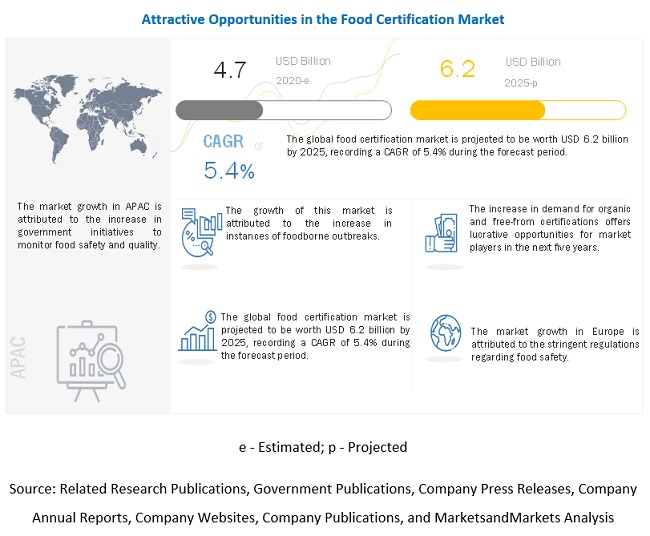The food certification market is estimated to account for a value of USD 4.7 billion in 2020 and is projected to reach a value of USD 6.2 billion, with a CAGR of 5.4% for the forecast period 2020-2025. The growth of the food certificationmarket is driven by various factors, such as increasing instances of foodborne illness, need to opt for safe food, increase in global trade of food products and strict standards in food industry and certification requirments.
Key players in the food certification market include SGS (Switzerland), DNV (Norway), Lloyd’s Register (UK), Bureau Veritas (France), Control Union Certifications (Netherlands), Intertek (UK), Eurofins (Luxembourg), TÜV SÜD (Germany), AsureQuality (New Zealand), DEKRA (Germany), Kiwa Sverige (Sweden), ALS (Australia), and NSF International (US). Service launches, acquisitions, agreements, collaborations, and partnerships were some of the core strengths of the leading players in the food certification market. These strategies were adopted by the key players to increase their market presence. It also helped them diversify their businesses geographically, strengthen their distribution networks, and enhance their product portfolios. Some of the other leading players in the food certificationmarket include Aspirata (South Africa), International Certification Ltd (New Zealand), Control Union Certifications (Netherlands), Indocert (India), TQ Cert (India), Eurofins (Luxeumbourg), Socotec (France) and MS Certification Services (India).
Download PDF brochure: https://www.marketsandmarkets.com/pdfdownloadNew.asp?id=82063283

DEKRA (Germany) is one of the leading organizations in the testing and certification market operating through business segments which are vehicle inspection, product testing, consulting, training, claims & expertise, industrial inspection and audits, and temp work. The food certification services are offered through the audits service division. It offers food certifications, such as BRC and IFS, for consumer products. It has a wide network of distribution operating in more than 60 countries. It has adopted mergers and acquisitions as strategies to expand its presence across regions such as US, China, South Africa, and New Zealand, in the food and consumer products certification market. In October 2020, DEKRA announced the mergers of DEKRA Process Safety with its business DEKRA Organizational Reliability to form DEKRA Organizational and Process Safety (DEKRA UK Ltd.), which is a one-stop-shop for high hazard processes in the pharmaceutical and food industries, offering various practical solutions in the process and behavioral safety.
SGS (Swizerland) is one of the major leaders in the food and material testing market. It offers various inspection, verification, testing, and certification services with business operating through nine business segments, which include agriculture, food and life, minerals, oil, gas and chemicals, consumer and retail, certification and business enhancement, industrial, environment, health and safety, transportation, and governments and institutions. It offers food certification services under its agriculture, food, and life segments. It has a network spread in more than 140 countrieswith 2600 offices across regions such as Americas, Asia Pacific, Europe, Africa, and the Middle East. The subsidiaries through which the company operates in various regions include SGS North America Inc. (US), SGS United Kingdom Limited (UK), Galson Laboratories (US), Intron BV (Netherlands), and SGS Canada Inc. (Canada). The company adopts various strategic moves like new product launch and expansion in order to strengthen its business hold. In August 2020, during the outbreak of COVID-19, SGS launched remote FSMA certification audits to offer flexibility for food suppliers to opt for a full accredited certification audit for FSMA FSVP with assurance of food products safety throughout the supply chain.
COVID-19 impact on Food certification market
The Food certification market includes major Tier I and II suppliers like SGS (Switzerland), DNV (Norway), Lloyd’s Register (UK), Bureau Veritas (France), Control Union Certifications (Netherlands), Intertek (UK), and Eurofins (Luxembourg). These suppliers have their manufacturing facilities spread across various countries across Asia Pacific, Europe, North America, South America, and RoW.
With the increase in the global food trade and the expansion of manufacturing units for processed food products, the growers are focusing on ensuring the safety and quality of their food products. However, food operations are affected around the globe due to COVID-19 pandemic. IT has impacted the meat products market due to the negative publicity by social media on the health risks associated with the consumption of animal-based products. These factors are projected to drive the demand for plant-based products free-from products , which is projected to encourage the growth of the market for plant-origin food certifications.
By application, meat, poultry & sea-food products segment is projected to dominate the Food certification market during the forecast period.
The cases of meat farus is increasing with increased demand for processed meat products. The number of malpractices or adulteration is increasing day by day across the world leading to many health issues resulting in the improved growth of meat certification. Religious concerns among consumers, especially Jewish and Muslims communities, is driving the demand for certified products which are in compliance with their beliefs, therefore the market is driven for halal and kosher certifications for meat products.
Make an Inquiry: https://www.marketsandmarkets.com/Enquiry_Before_BuyingNew.asp?id=82063283
The increasing demand for food safety standards in the North American region is driving the growth of the Food certification market.
The region is witnessing more number of deaths due to foodborne illness. Hence, the US government is focusing more on the safety, quality, and operation practices conducted by food facilities that manufacture, process, pack, and store food products. The stringent regulations imposed by regulatory bodies to maintain the standard and quality of food products is projected to drive the growth of the food certification market in the North America. The inspections are carried out to gain consumer confidence and ensure that food products are compliant with the regulations. The regulatory bodies like FDA controls the major accreditation bodies in the US and sets standards and regulations pertaining to the safety of food & beverages.
